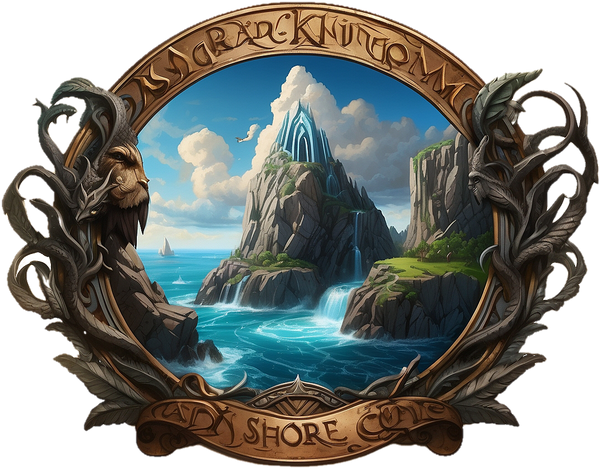Viking Tales: Wyrd-Walker
Share
They said the Viking gods no longer walked Midgard.
But he knew that wasn’t true.
The old man’s name was forgotten by time, yet the ravens, those shadows of the high halls, still remembered him. A solitary figure with a wolfskin cloak and a deep, vacant scar across his left eye, a detail straight out of Odin myths, he wandered from village to village, never staying, never asking. Only watching. Listening.
Children whispered that he was cursed. The Warriors claimed he was mad. But the runes carved into the shaft of his staff spoke otherwise, deep, ancient runes etched in an age when the stars were closer and the Norse mythological figures were clearer. His presence was a whisper of Seiðr, a knowledge of deep magic.
They called him the Wyrd-Walker. The one who walks with fate and sees the tangled thread of destiny.
One winter night, as snow crept down the fjord and ice crusted over the mead barrels, he arrived at a village nestled between stone cliffs and a black forest. He stood at the threshold of their hall, silent, until the jarl, recognizing the shadow of sacred mystery, granted him fire and food.
He did not thank them.
Instead, he spoke, his voice gravelly, like stones dragged by a glacier.
“The great serpent stirs beneath the world. The roots of Yggdrasil are trembling. The end of days begins in a whisper.”
The fire hissed. The wind howled against the thatch roof. And the old jarl, whose own beard was dusted with frost, narrowed his eyes.
“You speak of Jörmungandr and the twilight of the gods,” he said cautiously. “Why bring such heavy news now?”
The old man turned to the fire and whispered: “Because I saw him last night—coiled around the sun, waiting to be unbound. This is not a vision,” he added, his pale eye catching the light, “it is a memory.”
The villagers laughed. Nervously.
But the seer, a young woman marked by the gods by a strange, quiet intensity, leaned forward.
“Where did you receive this memory?” she asked. “What power guides your sight?”
“Not a vision,” he said again. “A memory of a path I have walked before.”
That night, the villagers dreamed of a vast sea serpent whose breath froze oceans and whose body threatened to crush the world. When they awoke, the Wyrd-Walker was gone—but not before leaving a single, powerful Norse rune carved into the threshold of the longhouse:
ᚠᚱᛁᚷᚷ Frigg.
The goddess of foresight. Of hidden fate. Of silent, powerful domestic magic. A sign that the future was sealed, but not without guidance.
Days passed. The seer followed his tracks, compelled by a destiny that was suddenly clearer than her own past.
They led not south to warmth, but north into the endless, desolate white.
For weeks, she journeyed across ice-choked rivers and snow-blanketed forests, following signs only the stars and the wind could read. Ravens, two silent, familiar figures, appeared at every turn. Wolves did not harm her. Fires lit without kindling. She was guided by something ancient.
Finally, atop a frozen ridge beneath the green flicker of auroras, she saw him.
He stood alone, staff raised toward the heavens, speaking not to her but to the vast, indifferent sky.
“You came,” he said without turning. “She said you would. The Queen of Fólkvangr honors her promises.”
“Who?” the seer asked.
He lowered the staff. His eyes were pale blue, like a frozen lake, holding a million distant stars.
“Frigg.”
He sat beside a half-buried stone altar, its surface carved with spirals and serpents. “This place,” he said, his voice softer, “is forgotten even by the gods. But it remembers them. It remembers the original Wyrd.”
The seer stepped forward, drawn not by curiosity, but by recognition of a shared, terrible burden.
“What do you see here?” he asked.
She closed her eyes.
“I see Jörmungandr, curled beneath the sea. I see Fenrir, bound by fate. I see Sköll chasing the sun. I see... a mirror of what is, and what must be.”
The Wyrd-Walker smiled, a cold, weary curve of the mouth.
“You’re ready. The gift of walking with Wyrd is knowing the path, but choosing the steps.”
He placed a smooth bone talisman in her hand, etched with a Vegvisir, the norse symbol of the wayfinder. “Your path will not be straight. But it will be yours, and it will be honored.”
She blinked, and he was gone. Dissolved into the driving snow like a memory.
Only his staff remained, planted upright in the snow like a silent, towering monument.
Years passed. The seer became a skald. The skald became a priestess. Villages knew her name, though they whispered the same title. Jarls sought her wisdom. But she never stayed long.
She walked the land as he once had, listening to the wind and marking the stars. The Vegvisir never left her neck. She never got lost, for she carried the wisdom of fate with her.
They whispered now of her.
The Wyrd-Walker reborn. But she was not him. She was her own destiny.
Guided not by voices, but by echoes of something older than the gods.
And so the viking tale passed into legend.
But the staff still stands, somewhere in the north, frozen in time.
Some say it marks where the world serpent sleeps.
Others say it marks where the gods once listened.
But the old seers know better.
They say it marks the place where a soul chose destiny over comfort.
A path walked not with feet, but with faith.
Let the wind howl. Let the serpent stir.
The Wyrd-Walker walks still.
